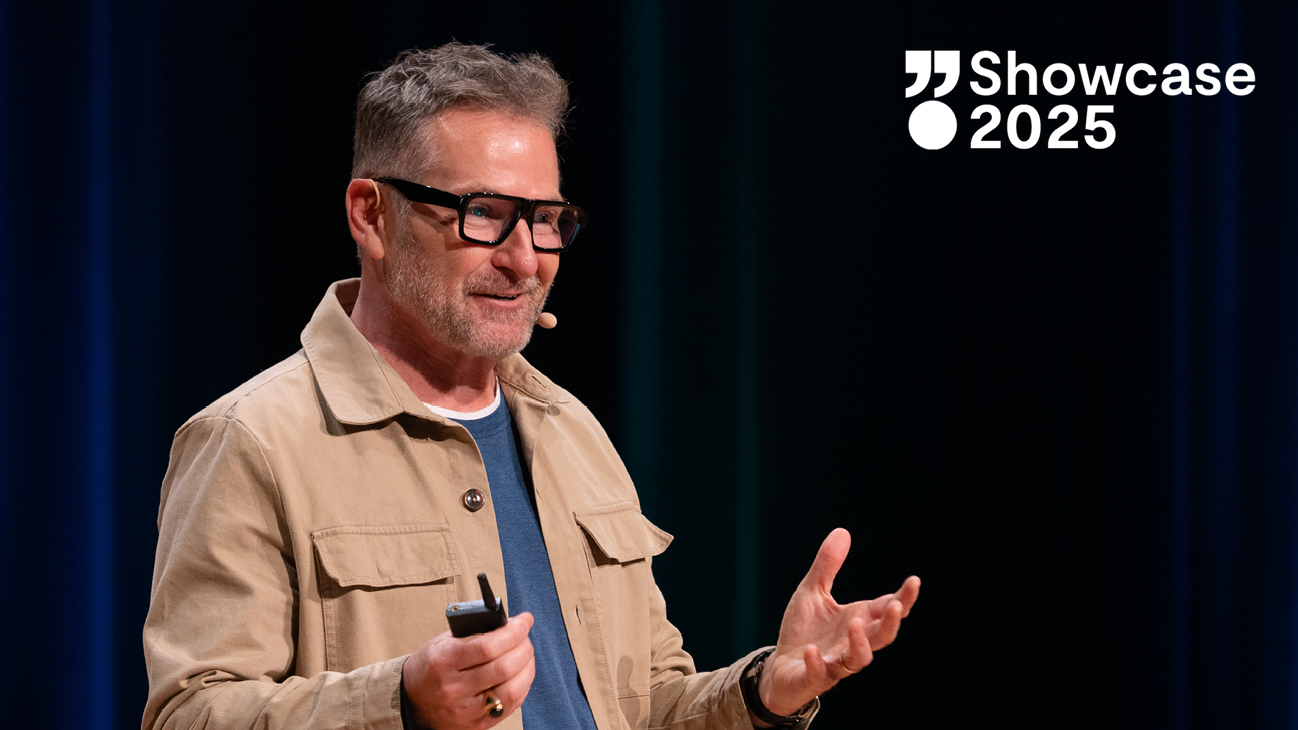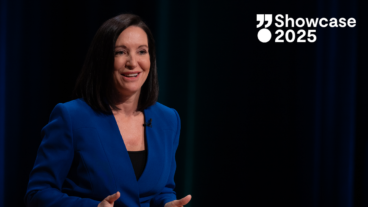In an era of unprecedented change, where the landscape of commerce is evolving at an exponential pace, we stand at the cusp of a complete redefinition of what it means to compete in the 21st century.
Called “the futurist that futurists follow”, Doug Stephens is one of the world’s foremost business futurists and retail industry experts. As one of our featured speakers at Showcase 2025 — Speakers Spotlight’s annual client-exclusive, TED-style event — Doug outlined the four pillars that will define the future of competitive advantage, diving deep into the key factor that drives it all.
With Canada at a crossroads, this year’s event theme was “Meeting the Moment” with each presenter offering clarity and guidance to help navigate the challenges ahead — from a big picture perspective to an organizational, leadership, and individual lens. Doug provided the organizational view, giving a thought-provoking exploration of how democracy serves as the foundation for all future business success and why we’re standing perilously close to losing it.
Great morning with a lineup of highly diverse and distinctive speakers — all topics relevant to current issues.
Showcase 2025 attendee
The Four Pillars of Competitive Advantage
With the very nature of competition being redefined before our eyes, Doug believes it’s crucial for every business — big or small — to rethink their relationship and dependency on four key pillars that define the future of competitive advantage:
- Capitalism: How businesses operate within and contribute to economic systems.
- Growth: How organizations define, pursue, and measure sustainable expansion.
- Education: How we develop and tap into human capital and knowledge.
- Democracy: The political foundation that enables free markets to function.
Of the four, democracy is the key factor as without it, the others fall. It’s also in the most peril, Doug said, as faith in the institution of democracy worldwide is fading.
Democracy Under Threat
While the 2025 Canadian election boasted a record number of voters, with 68% of eligible Canadians taking to the polls, this good news story does not make us immune to what’s happening globally, particularly south of the border. “It took the US 250 years to build the democracy they have and 100 days to put it on the precipice of vanishing,” Doug said.
According to Doug, democratic erosion stems from four factors:
- Economic inequality: Middle-income Canadians work harder today than ever before, yet never seem to get ahead. The top 10% get richer while the rest merely tread water.
- Electoral corruption: Corporate lobbying has reached unprecedented levels, creating loopholes that favour corporate interests, making citizens question whether their votes matter.
- Technology-driven division: Social media platforms profit from outrage and fear. These aren’t bugs, Doug said, but deliberate features, leaving populations divided and distrustful.
- Partisan gridlock: The era of big policies and ideas that move society forward seems to have ended, Doug said. This vacuum opens doors for populist figures who leverage anxiety to undermine democratic norms.
This is what we’re seeing in the US today, Doug said. Americans left the door open for populist leaders and since President Donald Trump took office in January 2025, we’ve witnessed the erosion of democracy to the point that the US is at risk of losing their democratic status.
What’s particularly concerning, Doug said, is the “deafening silence” from corporate leaders, with many appearing to capitulate towards changing political winds rather than defending democratic principles — the very principles that contributed to their business success.
The Business Case for Democracy
Businesses exist to make revenue, profit, and satisfy shareholders. This is not possible, Doug said, without a free market economy, which cannot exist without healthy, public institutions. No democracy, no free markets. Why? Because free markets rely on the rule of law.
Every financial crisis dating back to the early 1800s occurred because of deregulation. Markets are not good at managing themselves, Doug said. They require laws to ensure price fixing and anti-competition activity is regulated and that businesses can conduct themselves uninhibited by political coercion.
Other key business advantages of democracy include:
- Investment security: Capital flows toward predictable environments.
- Access to education and healthcare: Quality education and healthcare yield a healthy, talented, and skilled workforce that boosts productivity.
- Diversity: The foundation of equal opportunity.
- The right to protest: Dissent, or the right to question, is fundamental to innovation.
The business argument is clear: if businesses and investors seek certainty and predictability, democracy is the foundation that delivers those conditions. The data supports this, Doug said. Democratic nations consistently outperform authoritarian regimes economically.
A Call to Action for Business Leaders
Recognizing that Canada’s democracy requires action to protect it, Doug outlined three concrete steps businesses can take:
- Educate: Share with leadership the economic stakes and benefits of democracy and the difference between normal policy debates and the erosion of democratic values. Also emphasize the importance of voting to all employees.
- Organize: Join or create groups with like-minded businesses that support democratic values, and support political candidates that uphold those values.
- Activate: Uphold diversity, equity, and inclusion (DEI) programs despite political pressures — diverse organizations outperform non-diverse ones by 39%, Doug said. While activating, also provide paid time for employees to vote, question your company’s need for social media platforms that consistently undermine democratic discourse, engage with government partners, and proudly proclaim your support for democracy. As Doug noted, “68% of Canadians will support you… In marketing terms, that’s a big ass market.”
We can already see businesses around the world taking these steps. Lush left all social media channels in 2021 and hasn’t suffered economically, Doug said. They found new ways to engage customers. Plus, IKEA is tackling global deforestation with key government partners while the Retail Council of Canada has created a groundbreaking code of conduct in the grocery category.
Engineering Our Future: Book Doug Stephens for Your Next Event
Doug’s final message resonated throughout the room: “We have a choice. We can do nothing and hope for the future we get, or we can be clear-eyed about the value of our democracy and engineer the future we want. Your future begins right now.”
As founder and CEO of Retail Prophet, Doug is the go-to authority for global brands like IKEA, Nike, Coca Cola, and Louis Vuitton. His dynamic keynotes reveal the surprising competitive advantages waiting for organizations bold enough to take action.
Contact us to learn more about Doug and gain the competitive edge needed to thrive in this new era of commerce.




